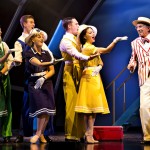The season of three plays from Spain’s Golden Age continues at the Arcola and, as was to be expected, Lope de Vega’s Punishment Without Revenge, is a great improvement on Tirso de Molina’s Don Gil of the Green Breeches, which I saw last week. .
Lope de Vega (1562-1635) is Spain’s greatest dramatist of the Golden Age. He had a prodigious talent. 400 of his plays survive; which means that over a 50-year period he was writing one play a month.
Punishment Without Revenge, a tale of love, lust, incest, adultery, honour and death, written in 1631 and told with considerable compassion, wit, irony and humanity, is generally considered his masterpiece.
The present revival by Laurence Boswell (who directed the last production of the play at the Gate Theatre in Notting Hill Gate in 1990) makes you wonder why it has not been performed more often and why it has not been performed by the National Theatre and the Royal Shakespeare Company?
The Duke of Ferrara (William Hoyland), a libertine, infamous for his debauchery and depravity, returns from the wars, a reformed man. He discovers that in his absence his young illegitimate son (Nick Barber) has been having an affair with the Duchess (Frances McNamee) whom he has only recently married. Honour dictates that he has to do something about it (like murder his wife) but how can he do that without compromising his honour? He comes up with a cunning plan.
The tragic irony is that the Duke loves his son more than his wife, whom he only married for political reasons. He does not sleep with her because he is frightened she will bear him a child and that the child will inherit the kingdom he has already promised his son.
The play, well directed and elegantly designed, is well acted by a permanent ensemble for the three plays and includes Simon Scardifield, an actor with such a distinctive comic style and such a distinctive way of breaking up his dialogue, that he commands the stage totally whenever he appears.
by Robert Tanitch, Mature Times theatre reviewer
To learn more about Robert Tanitch and his reviews, click here to go to his website





